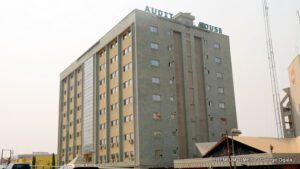
SERAP, 20 Nigerians file lawsuit against Akpabio, Abbass over allocation increase to N344bn
Socio-Economic Rights and Accountability Project (SERAP) and 20 other Nigerians have filed a lawsuit against the Senate President, Godswill Akpabio, and Speaker of the House of Representatives, Tajudeen Abbas “for unilaterally and arbitrarily increasing the allocation for lawmakers from N197bn to N344bn, their highest since the return of democracy in 1999.”
Mr Akpabio and Mr Abbas are sued for themselves and on behalf of all members of the National Assembly.
The lawmakers had last month raised their allocation from N197 billion proposed by President Bola Tinubu for them in the budget to N344 billion. The lawmakers will in total draw N514 billion from the 2024 budget. The lawmakers also in 2023 arbitrarily increased their own budget from the originally proposed N169 billion to N228 billion.
In the suit number FHC/ABJ/CS/68/2024 filed last Friday at the Federal High Court, Abuja, the Plaintiffs are asking the court to determine “whether the lawmakers, in the exercise of their powers over appropriation/money bills, can unilaterally increase their own budget without the re-presentation of the budget by the Executive.”
The Plaintiffs are asking the court for “a declaration that the National Assembly, in the exercise of its powers over appropriation/money bills, cannot unilaterally increase its own budget without the re-presentation of the budget by the President in line with section 81 of the Nigerian Constitution 1999 [as amended].”
The Plaintiffs are asking the court for “a declaration that the action of the National Assembly, unilaterally increasing its own budget from N197 billion to N344 billion, without the re-presentation of the budget by the President is a breach of the democratic principles of separation of powers and checks and balances.”
The Plaintiffs are seeking “an order of perpetual injunction restraining and preventing the National Assembly from unilaterally increasing its own budget, in the exercise of its powers over all appropriation/money bills, without the re-presentation of such appropriation/money bills by the President in line with the Nigerian Constitution.”
In the suit, the Plaintiffs are arguing that: “Allowing the National Assembly to continue to unilaterally and arbitrarily increase its own budget would fundamentally undermine the letter and spirit of the Nigerian Constitution, public trust, and the rule of law.”
The Plaintiffs are also arguing that “The arbitrary and self-serving increase by the lawmakers of their own allocation offends the Code of Conduct for Public Officers [Fifth Schedule Part 1] of the Nigerian Constitution, oath of office, and the democratic principles of separation of powers and checks and balances.”
According to the Plaintiffs, “Unless the reliefs sought are granted, the National Assembly will continue to breach the provisions of the Nigerian Constitution and the rule of law, and at the expense of millions of Nigerians living in poverty.”
The suit filed on behalf of SERAP and 20 concerned Nigerians by their lawyers Kolawole Oluwadare and Andrew Nwankwo, read in part: “Members of the National Assembly are public officers who have sworn the constitutional oath of office to perform their respective duties in the interest of Nigerian citizens.”
“The members of the National Assembly, by unilaterally and arbitrarily increasing their own budget in the Appropriation Bill 2024, without the re-presentation of the budget by the President has violated the Code of Conduct for Public Officers.
“Paragraph 1 of the Code of Conduct for Public Officers which provides that ‘a public officer shall not put himself in a position where his personal interest conflicts with his duties and responsibilities.’
“Members of the National Assembly have put their interest above the public interest and ‘well-being and prosperity of the Federal Republic of Nigeria’, contrary to their oath of office.
“It is a necessary implication of the rule of law that, except where the law gives a discretion to a public functionary, he can only act in accordance with the law, as to do otherwise may enthrone arbitrariness.
“The increase and insertion of line items in the Appropriation Bill 2024 by the National Assembly is not commensurate with the constitutional commitments to public services and goods; decreasing public revenues and increasing level of public debts, and the poor economic and social realities in Nigeria.
“The President presented the Appropriation Bill 2024 made up of N27.5 trillion Naira to the National Assembly on 29 November 2023. The National Assembly on 30th December, 2023 passed the Appropriation Bill 2024 in the sum of N28.7 Trillion.
“That while exercising its legislative powers, the 1st and 2nd Defendants increased the Appropriation Bill by N1.2 Trillion, wherein the 1st and 2nd Defendants unilaterally increased allocations made to the National Assembly in the Appropriation Bill 2024 presented by the President from N197,932,625,616 Billion Naira to N344.85 Billion.
“The President signed the ¦ 28.7 Trillion Appropriation Bill 2024 into law on 1st January, 2024. The 2024 Budget is in deficit of ¦ 9.18 Trillion.
“The Budget/Appropriation Act 2024 is yet to be gazetted as at the time of filing this suit and public access to the gazetted 2024 Budget/Appropriation Act is restricted.
“The National Assembly after inserting new line items to the Appropriation Bill 2024 and altering the budgetary allocation to already inserted line items did not submit same to the President for re-presentation by the President before going ahead to present the Appropriation Bill to the President for assent.”
SERAP and 20 concerned Nigerians are also asking the court for the following reliefs: “A DECLARATION that the action of the National Assembly, unilaterally increasing the budget of the National Assembly from 197 billion Naira to 344 billion Naira, in the exercise of its powers over Appropriation Bill 2024, without the re-presentation of the budget by the President is a breach of section 81 of the Nigerian Constitution 1999 [as amended], the Code of Conduct for Public Officers [Fifth Schedule Part 1] of the Nigerian Constitution, Oath of office [Seventh Schedule] and section 81 of the Nigerian Constitution.
“AN ORDER OF PERPETUAL INJUNCTION OF THE HONOURABLE COURT restraining and preventing the National Assembly from unilaterally increasing the budget of the National Assembly, in the exercise of its powers over all appropriation/money bills, without the re-presentation of such appropriation/money bills by the President in compliance with section 81 of the Nigerian Constitution 1999 [as amended] and the democratic principles of separation of powers and checks and balances.
“AN ORDER OF THE HONOURABLE COURT directing, compelling and mandating the National Assembly, in the exercise of its powers over all appropriation/money bills, to comply with section 81 of the Nigerian Constitution 1999 [as amended] by sending such appropriation/money bills to the President for re-presentation before the National Assembly in compliance with section 81 of the Nigerian Constitution and the democratic principles of separation of powers and checks and balances.
No date has been fixed for the hearing of the suit.



